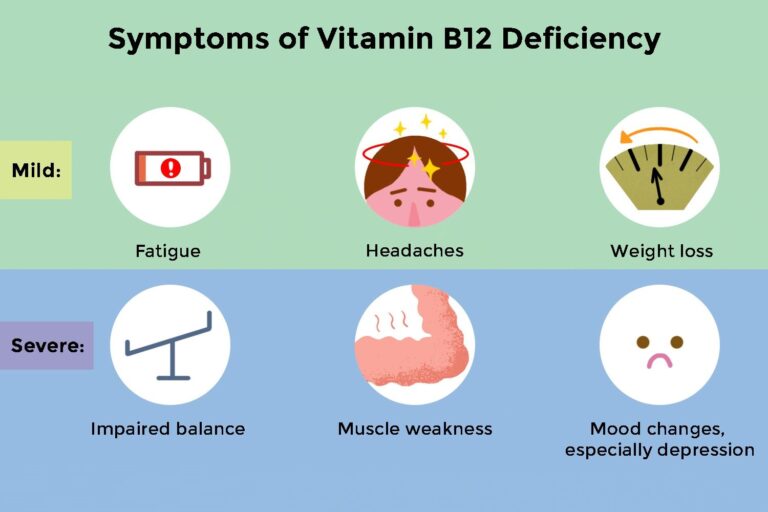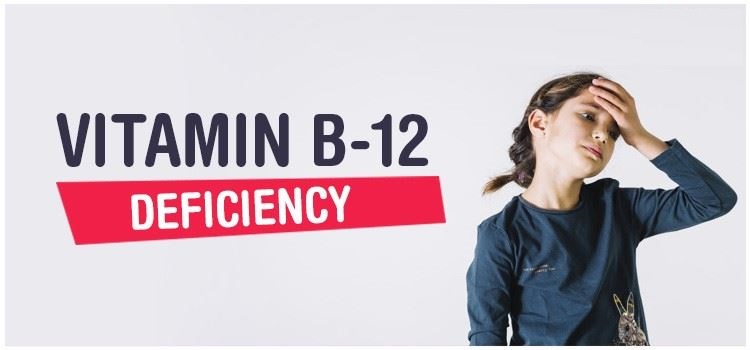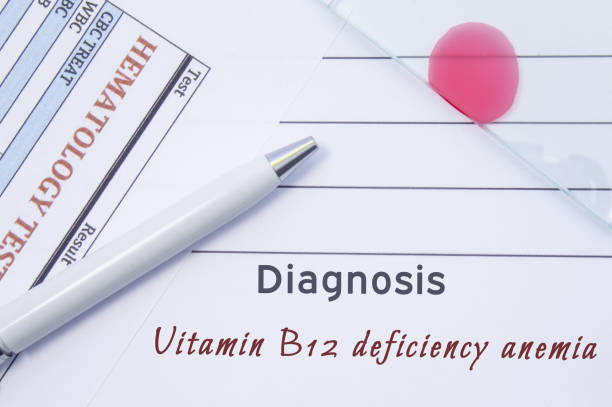VITAMIN DEFICIENCY ANEMIA – SYMPTOMS, CAUSES, AND TREATMENT
Vitamin deficiency anemia is a lack of healthy red blood cells caused by lower than the normal levels of vitamin B-12 and folate.
This could occur if you do not eat enough foods containing vitamin B-12 and folate, or if your body has trouble absorbing or processing these vitamins.
Without these nutrients, the body produces red blood cells that are too large and do not work properly. This limits their capacity to carry oxygen.
Symptoms could include fatigue, shortness of breath, or dizziness. Vitamin supplements, taken by pill or injection, could correct the deficiencies.

SYMPTOMS
Vitamin deficiency anemia usually develops gradually over several months to years. Signs and symptoms might be subtle at first but usually, increase as the deficiency worsens. These might include:
- Fatigue
- Shortness of breath
- Dizziness
- Pale or yellowish skin
- Irregular heartbeats
- Weight loss
- Numbness or tingling in the hands and feet
- Muscle weakness
- Personality changes
- Unsteady movements
- Mental confusion or forgetfulness

CAUSES
Vitamin deficiency anemia could happen if you do not eat enough foods containing vitamin B-12 and folate, or if your body has trouble absorbing or processing these vitamins.
Vitamin B-12 deficiencies
Low levels of vitamin B-12 could be caused by:
- Diet – Vitamin B-12 is primarily found in meat, eggs, and milk, so people who do not eat these types of foods might need to take B-12 supplements. Some foods have been enriched with B-12, including some breakfast cereals and some nutritional yeast products.
- Pernicious anemia – This condition happens when the body’s immune system attacks cells in the stomach that produce a substance known as an intrinsic factor. Without this substance, B-12 cannot be absorbed in the intestines.
- Gastric surgeries – If portions of your stomach or intestines have been surgically removed, that could reduce the amount of intrinsic factor produced and the amount of space available for vitamin B-12 to be absorbed.
- Intestinal problems – Crohn’s disease and celiac disease could interfere with absorption of vitamin B-12, as can tapeworms that might be ingested from eating contaminated fish.
Folate deficiencies
Also called vitamin B-9, folate is a nutrient found primarily in dark green leafy vegetables and liver. A folate deficiency could happen when people do not eat foods containing folate or their bodies are unable to absorb folate from food.
Absorption problems might be caused by:
- Intestinal diseases like celiac disease
- Surgical removal or bypass of a large portion of the intestines
- Excessive alcohol consumption
- Prescription drugs, like some anti-seizure medications
Pregnant women and women who are breastfeeding have an increased demand for folate, as well as people undergoing dialysis for kidney disease.
A lack of folate could cause birth defects during pregnancy. However, folate deficiency is less common now in countries that regularly add folate to food products like bread, cereals, and pasta.

COMPLICATIONS
Being deficient in vitamin B-12 or folate increases your risk of many health issues, including:
- Pregnancy complications – A developing fetus that does not get enough folate from its mother could develop birth defects of the brain and spinal cord.
- Nervous system disorders – Untreated, vitamin B-12 deficiency could lead to neurological problems, like persistent tingling in the hands and feet or problems with balance. It could lead to mental confusion and forgetfulness because vitamin B-12 is necessary for healthy brain function.
- Gastric cancer – Pernicious anemia raises the risk of stomach or intestinal cancers.
PREVENTION
You could prevent some forms of vitamin deficiency anemia by choosing a healthy diet that includes a variety of foods.
Food’s rich in vitamin B-12 include:
- Beef, liver, chicken, and fish
- Eggs
- Fortified foods, like breakfast cereals
- Milk, cheese, and yogurt
Food’s rich in folate include:
- Broccoli, spinach, asparagus, and lima beans
- Oranges, lemons, bananas, strawberries, and melons
- Fortified grain products, like bread, cereal, pasta, and rice
- Liver, kidneys, yeast, mushrooms, and peanuts
Most adults require these daily dietary amounts of the following vitamins:
- Vitamin B-12 — 2.4 micrograms (mcg)
- Folate or folic acid — 400 mcg
Pregnant and breastfeeding women might need more of each vitamin.
Most people get adequate vitamins from the foods they eat. But if your diet is restricted or you have had gastric bypass surgery, you might wish to take a multivitamin.

DIAGNOSIS
To help diagnose vitamin deficiency anemias, you may have blood tests that check for:
- The amount and appearance of red blood cells
- The number of vitamin B-12 and folate in the blood
- The presence of antibodies to intrinsic factors, suggests pernicious anemia
TREATMENT
Vitamin deficiency anemia is treated with doses of whatever vitamin is lacking. For pernicious anemia, vitamin B-12 is usually delivered via injection and might need to be taken regularly for the rest of your life.
Vitamin B-12 is available as:
- Injections into a muscle or underneath the skin
- Pills to be swallowed
- A liquid or tablet that dissolves beneath the tongue
- Nose gel or sprays
Medications to boost folate levels usually come as pills to be swallowed, but some versions could be delivered through a narrow, flexible tube into a vein (intravenously).
If you or anyone you know is suffering from vitamin deficiency anemia, our expert providers at Specialty Care Clinics will take care of your health and help you recover.
Call us on (469) 545-9983 to book an appointment with our specialists.
